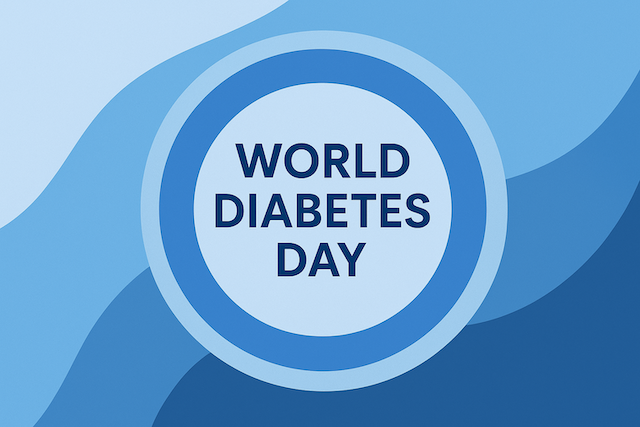Stay updated on what is trending in health. Discover tips and resources for a healthier, balanced life.
World Diabetes Day: Why It Matters & How You Can Take Action
World Diabetes Day raises awareness about prevention, early detection, and effective diabetes management to protect your long-term health and quality of life.
NEWS
Dr. S. Ali
11/15/20253 min read


Every year on November 14, millions of people around the globe come together for World Diabetes Day (WDD)—the largest awareness campaign for a single health condition. Whether you live with diabetes, care for someone who does, or simply want to protect your health, this day is a powerful reminder that small actions can make a big difference.
In this article, we’ll talk about what World Diabetes Day stands for, why diabetes is rising worldwide, and how you can take steps today to protect your health or support others.
What Is World Diabetes Day?
World Diabetes Day was created in 1991 by the International Diabetes Federation (IDF) and the World Health Organization (WHO). It raises global awareness about diabetes—its prevention, its complications, and the importance of early diagnosis and proper management.
The date, November 14, honors Sir Frederick Banting, one of the scientists who discovered insulin in 1921—a discovery that changed the lives of millions.
The official symbol of the day is the blue circle, representing unity in the fight against diabetes.
Why World Diabetes Day Matters More Than Ever
Diabetes is one of the fastest-growing health challenges of our time.
Over 540 million people are currently living with diabetes.
Nearly 1 in 2 adults with diabetes don’t even know they have it.
Diabetes is a leading cause of blindness, kidney failure, heart disease, stroke, and amputations.
The numbers are projected to rise significantly unless action is taken.
This makes awareness and early detection more important than ever.
Themes of World Diabetes Day
Each year, World Diabetes Day focuses on a theme. Recent themes include:
1. Access to Diabetes Care
Millions of people still cannot access:
Insulin
Blood glucose testing tools
Essential medications
Education and health services
The theme highlights the need for fair and affordable diabetes care worldwide.
2. Know Your Risk, Know Your Response
This theme encourages people to understand their personal risk and take proactive steps to prevent or delay type 2 diabetes.
Understanding Diabetes in Simple Terms
Type 1 Diabetes
An autoimmune condition where the body cannot produce insulin. It usually appears in childhood or adolescence but can occur at any age.
Type 2 Diabetes
The most common type. The body becomes resistant to insulin or doesn’t make enough of it. Often linked to lifestyle factors but also genetics.
Gestational Diabetes
Occurs during pregnancy and increases the risk of type 2 diabetes later for both mother and child.
Early Signs You Should Never Ignore
Many symptoms are mild or develop slowly. Watch for:
Frequent thirst and urination
Blurred vision
Unexplained fatigue
Slow-healing wounds
Tingling or numbness in hands/feet
Early diagnosis helps prevent long-term damage—especially to the eyes, kidneys, nerves, and heart.
How You Can Get Involved on World Diabetes Day
You don’t need a medical background to make a difference—small steps matter.
1. Get screened
If you are over 40, overweight, or have a family history of diabetes, screening is essential.
2. Learn your risk
Online tools from WHO or International Diabetes Federation can help assess your risk in minutes.
3. Spread awareness
Share accurate information on social media, join local events, or encourage family members to learn more.
4. Support someone living with diabetes
Sometimes, emotional support is just as important as medical care.
5. Make healthier lifestyle choices
Eat more fruits, vegetables, whole grains
Move daily—30 minutes is enough
Reduce sugary drinks
Maintain a healthy weight
Prioritize sleep and stress management
Diabetes and Eye Health: A Hidden Crisis
Many people don’t know that diabetes is a leading cause of vision loss.
High blood sugar damages the delicate blood vessels in the retina, leading to diabetic retinopathy.
The good news?
Regular eye exams can prevent 90% of diabetes-related blindness.
On World Diabetes Day, eye care professionals worldwide offer free or discounted screenings—take advantage if available.
Looking Ahead: A Future With Better Diabetes Care
Thanks to continuous research, the future of diabetes care is evolving quickly:
Advanced insulin pumps
Continuous glucose monitors (CGMs)
Artificial pancreas systems
New classes of medications
AI-powered diabetes prediction tools
Public health strategies to reduce risk factors
Hope is growing—and World Diabetes Day amplifies that message.
Final Thoughts
World Diabetes Day is more than an awareness campaign—it’s a global movement that encourages education, prevention, and support. Whether you’re living with diabetes or simply want to protect your health, today is the perfect moment to take a meaningful step.
Your choices matter. Your awareness matters. And together, we can change the future of diabetes.
Related Articles:
1. Diabetes and Your Eyes: What You Need to Know to Preserve Your Sight
2. Type 1 Diabetes: What It Is and Why Representation Matters
3. Ultra-Processed Foods: Heart Disease and Stroke Risks
Sources:
World Health Organization (WHO) — Diabetes
https://www.who.int/health-topics/diabetesInternational Diabetes Federation (IDF) — World Diabetes Day
https://worlddiabetesday.org/Centers for Disease Control and Prevention (CDC) — Diabetes
https://www.cdc.gov/diabetes/American Diabetes Association (ADA)
https://www.diabetes.org/National Institute of Diabetes and Digestive and Kidney Diseases (NIDDK)
https://www.niddk.nih.gov/health-information/diabetesMayo Clinic — Diabetes
https://www.mayoclinic.org/diseases-conditions/diabetes/symptoms-causes/syc-20371444Harvard T.H. Chan School of Public Health — Diabetes
https://www.hsph.harvard.edu/nutritionsource/disease-prevention/diabetes/Johns Hopkins Medicine — Diabetes
https://www.hopkinsmedicine.org/health/conditions-and-diseases/diabetesCleveland Clinic — Diabetes
https://my.clevelandclinic.org/health/diseases/7104-diabetesNational Health Service (NHS UK) — Diabetes
https://www.nhs.uk/conditions/diabetes/Pan American Health Organization (PAHO) — Diabetes
https://www.paho.org/en/topics/diabetes
Pulse Your Health
Empowering you to achieve your health goals.
Contact
© 2026. All rights reserved.
Disclaimer: The content on this website is for informational purposes only and is not medical advice. Always seek the advice of your physician or other suitably qualified healthcare professional for diagnosis, treatment and your health related needs.
